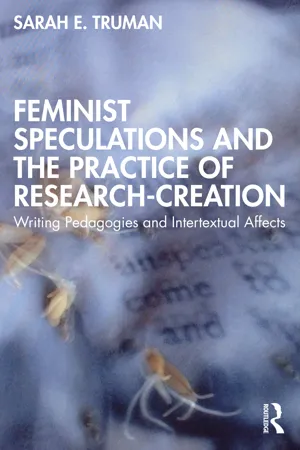
Feminist Speculations and the Practice of Research-Creation
Writing Pedagogies and Intertextual Affects
- 192 pages
- English
- ePUB (mobile friendly)
- Available on iOS & Android
Feminist Speculations and the Practice of Research-Creation
Writing Pedagogies and Intertextual Affects
About This Book
Feminist Speculations and the Practice of Research-Creation provides a unique introduction to research-creation as a methodology, and a series of exemplifications of research-creation projects in practice with a range of participants including secondary school students, artists, and academics.
In conversation with leading scholars in the field, the book outlines research-creation as transdisciplinary praxis embedded in queer-feminist anti-racist politics. It provides a methodological overview of how the author approaches research-creation projects at the intersection of literary arts, textuality, artistic practice, and pedagogies of writing, drawing on concepts related to the feminist materialisms, including speculative thought, affect theories, queer theory, and process philosophy. Further, it troubles representationalism in qualitative research in the arts. The book demonstrates how research-creation operates through the making of or curating of art or cultural productions as an integral part of the research process. The exemplification chapters engage with the author's research-creation events with diverse participants all focused on text-based artistic projects including narratives, inter-textual marginalia art, postcards, songs, and computer-generated scripts.
The book is aimed at graduate students and early career researchers who mobilize the literary arts, theory, and research in transdisciplinary settings.
Frequently asked questions
Information
1
THEORETICAL PRECURSORS
Tracing my methodology for research-creation
What do I mean by ‘humanism?’
Table of contents
- Cover
- Half Title
- Title
- Copyright
- Dedication
- Contents
- List of figures
- Acknowledgements
- Interstice I: And
- Preface: ‘What do Books have to do with Education?’
- 1 Theoretical precursors: Tracing my methodology for research-creation
- 2 Minor interferences: Marginalia as research-creation
- Interstice II: Citations
- 3 Affective public pedagogies: Youth writing the intersections of race-gender-power
- 4 More-than-linguistic rhetorics: Writing (speculative) mappings of place
- 5 Postcards from strangers: Queer-non-arrivals on a long-distance walk along St. Cuthbert’s Way
- Interstice III: Oblique Curiosities
- 6 Tweets & critiques from @postqual diffractor bot
- 7 Undisciplined: Reaffirming transdisciplinarity in social science and humanities research
- Interstice IV: Hyphen
- Index